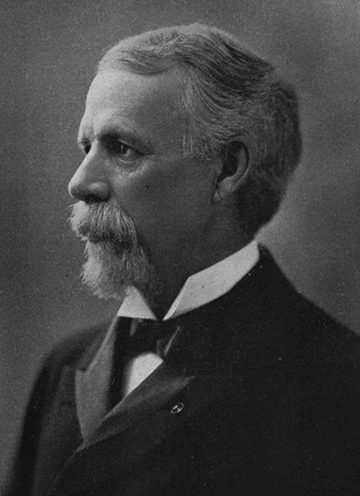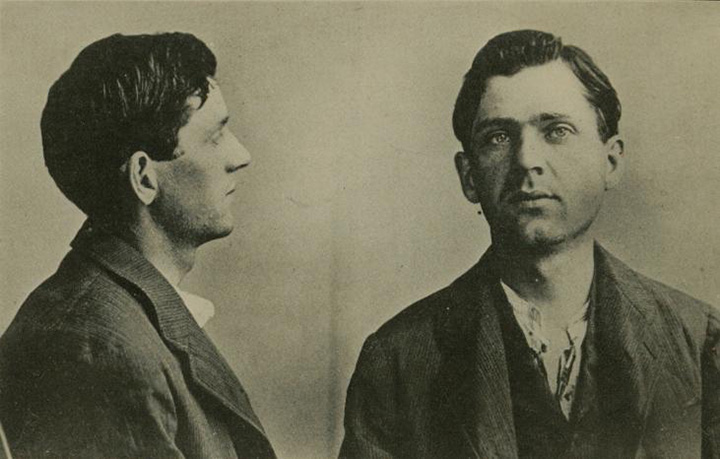Northeast Michigan connected to statewide, national political history

Courtesy Photo Gov. William Comstock pours a beer in this photo provided by Robert Haltiner through Alpena County Library Special Collections Department.
ALPENA — There may be no interstates running through Northeast Michigan, but roads here run far and fast enough to connect the region repeatedly with statewide and national politics.
Our sleepy burghs have given Michigan one governor and we’re connected to a second, the latter of whom went on to serve in a presidential administration.
We’ve raised Michigan’s longest-serving attorney general and a presidential assassin.
And this region, few and deceptively homogenous though its voters may be, has drawn several big political names to stump in our community halls.
As voters prepare to head to the polls in just over a week, here’s an inexhaustive list of some of the ways Alpena history has intersected statewide and national history:

Courtesy Photo Russell Alger
LOGGING MAN
Although more directly connected to Grand Rapids (where he met his wife) and Detroit (where he moved after the Civil War), one-term Michigan governor Russell Alger is connected to Northeast Michigan.
Alger, according to both the Detroit Historical Society and the National Governors Association, skyrocketed through the Union ranks during the Civil War, enlisting at the start of the war as a private and ending the war as a major general. After the war, he moved to Detroit and led a veterans group that helped secure pensions for Civil War soldiers.
He also got into the logging business and reportedly kept a home in Alcona County where he stayed to oversee his Up North operations.
Alger, a Republican, became Michigan governor in 1885 and served one term.

News File Photo Frank Kelley, center, Michigan’s longest-serving attorney general, smiles at the 2013 unveiling of a plaque honoring him at the Alpena County Courthouse. Kelley was city attorney in Alpena before being tapped by Gov. John Swainson to be attorney general.
In 1897, President William McKinley tapped Alger to serve as his secretary of war, a job Alger reportedly botched in his oversight of the Spanish American War. Alger resigned from the post and returned to Michigan, where, in 1902, then-Gov. Aaron T. Bliss appointed Alger to serve in the U.S. Senate. Alger was still a senator when he died in 1907.
AN ASSASSIN
Were it not for his Black River home, Alger still would be peripherally connected to Northeast Michigan by a bullet that pierced the stomach of a president.
Alger, as a then-former member of McKinley’s cabinet, was surely among the mourners who wept in 1901 as McKinley died from a bullet fired by Leon Czolgosz, an anarchist who spent much of his youth in Alpena (some sources say he was born in Alpena, others Detroit, others in Europe, according to Brittanica).
What is known is that, in the late 1800s, he was fired from a factory job and became obsessed with income inequality and radical anarchist teachings, including that of Gaetano Bresci, who had assassinated the king of Italy.

Courtesy Photo Leon Czolgosz’s mug shot.
In 1901, Czolgosz caught up with McKinley at the Pan-American Expo in Buffalo, New York, and shot him. McKinley died eight days later in a hospital. Czolgosz died a month later in an electric chair.
MAYOR TO GOVERNOR
Northeast Michigan’s first definitely native son to make it in statewide politics was William Alfred Comstock.
A successful businessman in real estate, banking, and railroads, Comstock served on the Alpena city council from 1911 to 1912 and as the city’s mayor from 1913 to 1914, according to the Governors Association.
He first went statewide as a regent at the University of Michigan and then then nationwide on the Democratic National Committee before becoming governor in 1933. During his brief, two-year term, Comstock signed the first state sales tax into law.

News File Photo Sarah Palin, former vice presidential candidate and former governor of Alaska, campaigns for Donald Trump in Alpena in 2016.
He lost his next election but stayed active on the state Civil Service Commission, which oversees state government employees, and later become a Detroit city councilman. He died in 1949.
A LAWMAN
Frank Kelley came from a family of influence in Wayne County’s Democratic circles, but he didn’t want to have his path carved out for him, according to a 2015 story from Michigan Radio.
That’s why Kelley moved up to Alpena as a Democrat in a town of Republicans, a place where he could make a name for himself by himself. He ran a law firm and eventually became the city attorney, hired by an all-Republican city council.
“Believe it or not that tolerant act by that group of Republicans to make me city attorney, I always remembered it,” Kelley told Leon Cohan in a 2004 interview for the Michigan Political Historical Society. “Years later, when I worked with you in the capital, I always remembered you don’t judge a book by its cover and don’t be too political. Remember there’s good people on both sides of the aisle.”

News File Photo This photograph shows the front page of the May 10, 1980 edition of The Alpena News, featuring coverage of then-presidential candidate George H.W. Bush’s campaign stop at Alpena High School.
His work in Northeast Michigan caught the attention of Gov. John Swainson, who named him Michigan attorney general. At the time, Kelley was the youngest attorney general in the country. When he retired 37 years later, he was the oldest attorney general in the country and held the record for the longest-serving attorney general until Iowa’s Tom Miller broke the record early this year.
Among the many things named after Kelley are the Institute of Ethics and the Legal Profession at Michigan State University and the Capitol Walkway that connects the Michigan Hall of Justice — home to the state Supreme Court — to the Capitol building in downtown Lansing.
“I’m very pleased to be in my adoptive home of Alpena and to hear all of the kind words,” Kelley told a crowd gathered at the Alpena County Courthouse in 2013 to honor him with a courthouse plaque. “The days I had in Alpena were very happy and we had a lot of fun. Being in this room brings back many memories. My law career in Alpena was like a Victorian success story you read in the 19th century. Everything you hoped would happen did happen and I met many wonderful people. It is a nice place to live and everyone is nice. I learned living in Alpena that, if you’re nice to somebody, just plain nice, regardless of religion or politics, 99 times out of 100, they will be nice back to you.”
ON THE STUMP
Like Kelley knew when he and his law school buddy hauled all their bound copies of Michigan’s Compiled Laws to Alpena decades ago, Northeast Michigan has a reputation as a solid Republican stronghold. Some of Alpena’s first settlers thought to name the city after John C. Fremont, the first Republican presidential candidate.
Indeed, Alpena, Presque Isle, Montmorency, and Alcona counties have collectively gone for the Republican in nine of the past 11 presidential elections.
But the region is more diverse than the red map might make it seem. Bill Clinton won the region handily in both 1992 and ’96, and, while the region as whole went for John McCain in 2008, Barack Obama actually carried both Alpena and Presque Isle counties by slim margins that year.
That means this region is not a sure thing for any candidate, and that has brought some big-name campaigners to try to rally the Up North crowds.
In 1980, George H.W. Bush spoke in Alpena in his first bid for president. One-time vice presidential nominee and former Alaska governor Sarah Palin stumped for Donald Trump here in 2016. Laura Bush has spoken here, as have many candidates for statewide office, including senator, attorney general, and governor.
“History shows even remote parts of contested states matter with the waves of politics,” Tim Kuehnlein, a political science instructor at Alpena Community College, said in an email to The News. “The region is more contested than meets the eye, and it shows that no vote should be taken for granted, even in small town remote regions of a state, especially in a battleground state.”
Justin A. Hinkley can be reached at 989-358-5686 or jhinkley@thealpenanews.com. Follow him on Twitter @JustinHinkley.
- Courtesy Photo Gov. William Comstock pours a beer in this photo provided by Robert Haltiner through Alpena County Library Special Collections Department.
- Courtesy Photo Russell Alger
- News File Photo Frank Kelley, center, Michigan’s longest-serving attorney general, smiles at the 2013 unveiling of a plaque honoring him at the Alpena County Courthouse. Kelley was city attorney in Alpena before being tapped by Gov. John Swainson to be attorney general.
- Courtesy Photo Leon Czolgosz’s mug shot.
- News File Photo Sarah Palin, former vice presidential candidate and former governor of Alaska, campaigns for Donald Trump in Alpena in 2016.
- News File Photo This photograph shows the front page of the May 10, 1980 edition of The Alpena News, featuring coverage of then-presidential candidate George H.W. Bush’s campaign stop at Alpena High School.










